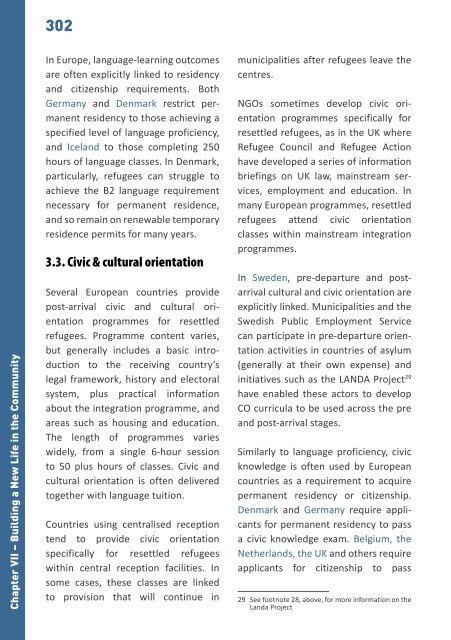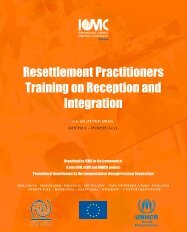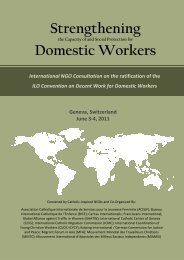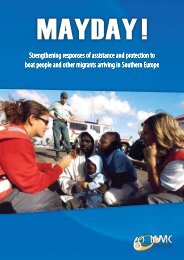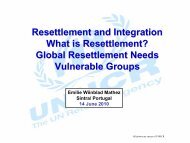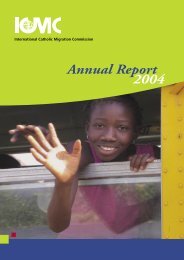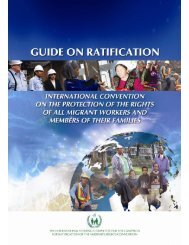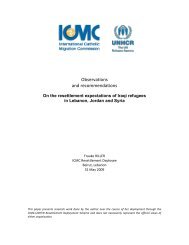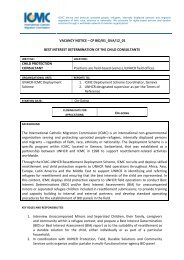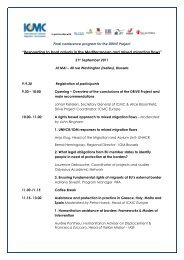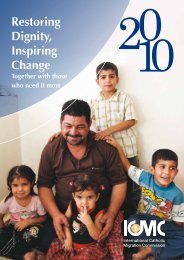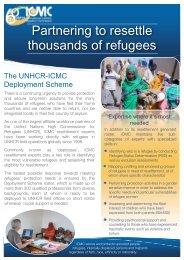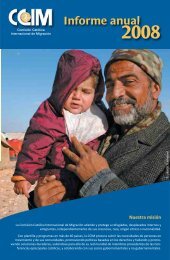ICMCEUROPE WelcometoEurope.pdf (5.89 MB)
ICMCEUROPE WelcometoEurope.pdf (5.89 MB)
ICMCEUROPE WelcometoEurope.pdf (5.89 MB)
You also want an ePaper? Increase the reach of your titles
YUMPU automatically turns print PDFs into web optimized ePapers that Google loves.
302<br />
Chapter VII – Building a New Life in the Community<br />
In Europe, language-learning outcomes<br />
are often explicitly linked to residency<br />
and citizenship requirements. Both<br />
Germany and Denmark restrict permanent<br />
residency to those achieving a<br />
specified level of language proficiency,<br />
and Iceland to those completing 250<br />
hours of language classes. In Denmark,<br />
particularly, refugees can struggle to<br />
achieve the B2 language requirement<br />
necessary for permanent residence,<br />
and so remain on renewable temporary<br />
residence permits for many years.<br />
3.3. Civic & cultural orientation<br />
Several European countries provide<br />
post-arrival civic and cultural orientation<br />
programmes for resettled<br />
refugees. Programme content varies,<br />
but generally includes a basic introduction<br />
to the receiving country’s<br />
legal framework, history and electoral<br />
system, plus practical information<br />
about the integration programme, and<br />
areas such as housing and education.<br />
The length of programmes varies<br />
widely, from a single 6-hour session<br />
to 50 plus hours of classes. Civic and<br />
cultural orientation is often delivered<br />
together with language tuition.<br />
Countries using centralised reception<br />
tend to provide civic orientation<br />
specifically for resettled refugees<br />
within central reception facilities. In<br />
some cases, these classes are linked<br />
to provision that will continue in<br />
municipalities after refugees leave the<br />
centres.<br />
NGOs sometimes develop civic orientation<br />
programmes specifically for<br />
resettled refugees, as in the UK where<br />
Refugee Council and Refugee Action<br />
have developed a series of information<br />
briefings on UK law, mainstream services,<br />
employment and education. In<br />
many European programmes, resettled<br />
refugees attend civic orientation<br />
classes within mainstream integration<br />
programmes.<br />
In Sweden, pre-departure and postarrival<br />
cultural and civic orientation are<br />
explicitly linked. Municipalities and the<br />
Swedish Public Employment Service<br />
can participate in pre-departure orientation<br />
activities in countries of asylum<br />
(generally at their own expense) and<br />
initiatives such as the LANDA Project 29<br />
have enabled these actors to develop<br />
CO curricula to be used across the pre<br />
and post-arrival stages.<br />
Similarly to language proficiency, civic<br />
knowledge is often used by European<br />
countries as a requirement to acquire<br />
permanent residency or citizenship.<br />
Denmark and Germany require applicants<br />
for permanent residency to pass<br />
a civic knowledge exam. Belgium, the<br />
Netherlands, the UK and others require<br />
applicants for citizenship to pass<br />
29 See footnote 28, above, for more information on the<br />
Landa Project


